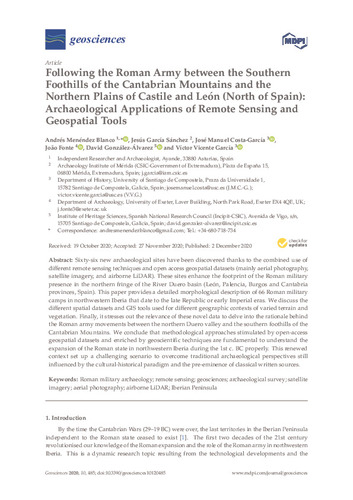Following the Roman Army between the Southern Foothills of the Cantabrian Mountains and the Northern Plains of Castile and León (North of Spain): Archaeological Applications of Remote Sensing and Geospatial Tools
Palabra(s) clave:
Roman military archaeology
Remote sensing
Geosciences
Archaeological survey
Satellite imagery
Aerial photography
Airborne LiDAR
Iberian Peninsula
Arqueología militar romana
Teledetección
Prospección arqueológica
LiDAR aéreo
Fecha de publicación:
Editorial:
MDPI
Versión del editor:
Citación:
Resumen:
Sixty-six new archaeological sites have been discovered thanks to the combined use of different remote sensing techniques and open access geospatial datasets (mainly aerial photography, satellite imagery, and airborne LiDAR). These sites enhance the footprint of the Roman military presence in the northern fringe of the River Duero basin (León, Palencia, Burgos and Cantabria provinces, Spain). This paper provides a detailed morphological description of 66 Roman military camps in northwestern Iberia that date to the late Republic or early Imperial eras. We discuss the different spatial datasets and GIS tools used for different geographic contexts of varied terrain and vegetation. Finally, it stresses out the relevance of these novel data to delve into the rationale behind the Roman army movements between the northern Duero valley and the southern foothills of the Cantabrian Mountains. We conclude that methodological approaches stimulated by open-access geospatial datasets and enri ...
Sixty-six new archaeological sites have been discovered thanks to the combined use of different remote sensing techniques and open access geospatial datasets (mainly aerial photography, satellite imagery, and airborne LiDAR). These sites enhance the footprint of the Roman military presence in the northern fringe of the River Duero basin (León, Palencia, Burgos and Cantabria provinces, Spain). This paper provides a detailed morphological description of 66 Roman military camps in northwestern Iberia that date to the late Republic or early Imperial eras. We discuss the different spatial datasets and GIS tools used for different geographic contexts of varied terrain and vegetation. Finally, it stresses out the relevance of these novel data to delve into the rationale behind the Roman army movements between the northern Duero valley and the southern foothills of the Cantabrian Mountains. We conclude that methodological approaches stimulated by open-access geospatial datasets and enriched by geoscientific techniques are fundamental to understand the expansion of the Roman state in northwestern Iberia during the 1st c. BC properly. This renewed context set up a challenging scenario to overcome traditional archaeological perspectives still influenced by the cultural-historical paradigm and the pre-eminence of classical written sources.
ISSN:
Patrocinado por:
The Warscapes project, focused on the archaeological exploration of Sasamón and Olmillos de Sasamón and managed by J. García Sánchez and José M. Costa-García, received funding from the Autonomous Government of Castile and León (Exp. B2020/003546), and the Provincial Council of Burgos (Exp. P037500G). J. García is a postdoctoral researcher from CSIC-Junta de Extremadura (TA18060); J. M. Costa-García is a postdoctoral I2C researcher of the Autonomous Government of Galicia (Grant Agreement ED481D 2019/006). J. Fonte is funded with a Marie Skłodowska-Curie Individual Fellowship (Grant Agreement No 794048) under the European Union’s Horizon 2020 research and innovation programme. D. González-Álvarez is a postdoctoral researcher at the Incipit-CSIC under the Juan de la Cierva-Formación programme, funded by the Spanish Ministry of Science (Grant agreement FJCI-2017-33731).
Ficheros en el ítem





